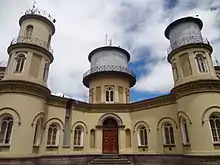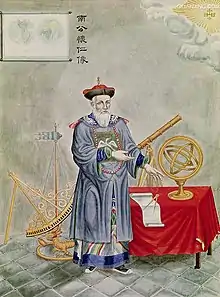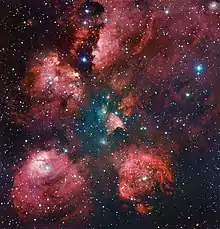Portal:Astronomy
|
The Astronomy Portal
Introduction Percival Lowell observing Venus from the Lowell Observatory telescope in 1914 Astronomy (from Ancient Greek ἀστρονομία (astronomía) 'science that studies the laws of the stars') is a natural science that studies celestial objects and phenomena. It uses mathematics, physics, and chemistry in order to explain their origin and evolution. Objects of interest include planets, moons, stars, nebulae, galaxies, and comets. Relevant phenomena include supernova explosions, gamma ray bursts, quasars, blazars, pulsars, and cosmic microwave background radiation. More generally, astronomy studies everything that originates beyond Earth's atmosphere. Cosmology is a branch of astronomy that studies the universe as a whole. Astronomy is one of the oldest natural sciences. The early civilizations in recorded history made methodical observations of the night sky. These include the Egyptians, Babylonians, Greeks, Indians, Chinese, Maya, and many ancient indigenous peoples of the Americas. In the past, astronomy included disciplines as diverse as astrometry, celestial navigation, observational astronomy, and the making of calendars. Nowadays, professional astronomy is often said to be the same as astrophysics. Professional astronomy is split into observational and theoretical branches. Observational astronomy is focused on acquiring data from observations of astronomical objects. This data is then analyzed using basic principles of physics. Theoretical astronomy is oriented toward the development of computer or analytical models to describe astronomical objects and phenomena. These two fields complement each other. Theoretical astronomy seeks to explain observational results and observations are used to confirm theoretical results. Astronomy is one of the few sciences in which amateurs play an active role. This is especially true for the discovery and observation of transient events. Amateur astronomers have helped with many important discoveries, such as finding new comets. (Full article...) General images -The following are images from various astronomy-related articles on Wikipedia.
|
 |
|
| WikiProject Astronomy | WikiProject Solar System |
|---|---|
| WikiProject Cosmology | WikiProject Spaceflight |
Selected image -

Hubble Space Telescope image of NGC 6052, discovered on 11 June 1784 by William Herschel. The two components of NGC 6052 are designated NGC 6052A and NGC 6052B are attracted by each other's gravity, have collided and are interacting with each other.
Astronomy News
- 5 April 2023 – Discoveries of exoplanets
- Scientists discover bursts of radiation in radio wavelengths on the exoplanet YZ Ceti b, which is part of the YZ Ceti system. The studies are published in the Nature Astronomy journal. (The Jerusalem Post)
May anniversaries
- 1 May 1959 – The former Beltsville Center is renamed to Goddard Space Flight Center in honor of Dr. Robert H. Goddard, rocket pioneer who achieved first launch of a liquid-fueled rocket
- 4 May 1967 – Lunar Orbiter 4 is launched to perform a photographic survey of lunar surface features
- 7 May 1975 – Explorer 53 (SAS-C), a NASA X-ray astronomy space telescope, is launched from the San Marco Range in Kenya, Africa
- 7 May 1997 – English-language French science fiction action film, The Fifth Element is released showing passenger inter-constellation vehicles, spacefighter craft, and various non-human creatures
- 14 May 1935 – The planetarium at Griffith Observatory in Los Angeles, California opens
- 14 May 1973 – The first American space station, Skylab, is launched
- 18 May 1969 – The Apollo 10 human spaceflight is launched, testing all aspects of the lunar landing mission, except the actual lunar landing
- 20 May 1978 – Pioneer Venus is launched from Cape Canaveral, Florida becoming the first spacecraft placed in orbit around Venus
- 30 May 1971 – Mariner 9 robotic space probe is launched becoming the first spacecraft to orbit Mars
Space-related Portals
Astronomical events
All times UT unless otherwise specified.
| 1 May, 23:19 | Mercury at inferior conjunction |
| 5 May, 13:49 | Lyrids peak |
| 5 May, 17:23 | Full moon and penumbral lunar eclipse |
| 9 May, 21:26 | Uranus at conjunction |
| 11 May, 04:57 | Moon at perigee |
| 17 May, 13:18 | Moon occults Jupiter |
| 19 May, 15:53 | New moon |
| 26 May, 01:39 | Moon at apogee |
| 29 May, 04:59 | Mercury at greatest western elongation |
Topics
Subcategories
Things you can do
|
Here are some Open Tasks :
Astronomy featured article candidates:
Astronomy articles for which peer review has been requested:
|
Wikibooks
These books may be in various stages of development. See also the related Science and Mathematics bookshelves.
- Astronomy
- GAT: A Glossary of Astronomical Terms
- Introduction to Astrophysics
- General relativity
- Observing the Sky from 30°S
- Observing the Sky from 40°N
Wikijunior
Associated Wikimedia
The following Wikimedia Foundation sister projects provide more on this subject:
-
 Commons
Commons
Free media repository -
 Wikibooks
Wikibooks
Free textbooks and manuals -
 Wikidata
Wikidata
Free knowledge base -
 Wikinews
Wikinews
Free-content news -
 Wikiquote
Wikiquote
Collection of quotations -
 Wikisource
Wikisource
Free-content library -
Wikiversity
Free learning tools -
 Wiktionary
Wiktionary
Dictionary and thesaurus
-
 List of all portalsList of all portals
List of all portalsList of all portals -
 The arts portal
The arts portal -
 Biography portal
Biography portal -
 Current events portal
Current events portal -
 Geography portal
Geography portal -
 History portal
History portal -
 Mathematics portal
Mathematics portal -
 Science portal
Science portal -
 Society portal
Society portal -
 Technology portal
Technology portal -
 Random portalRandom portal
Random portalRandom portal -
 WikiProject PortalsWikiProject Portals
WikiProject PortalsWikiProject Portals
Shortcuts to this page: Astronomy portal • P:ASTRO

.jpg.webp)




.jpg.webp)






















.jpg.webp)

.jpg.webp)
